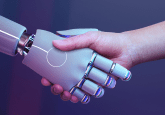Can GPT-3 create solutions for some of society’s biggest challenges?

A recent study has examined the potential of GPT-3 to provide novel insights and suggest AI solutions for the challenges associated with societal megatrends.
AI may have what it takes to address global societal challenges, according to results from a recent study analyzing responses from OpenAI’s GPT-3 (Generative Pre-trained Transformer 3). The study, led by Daniela Haluza and David Jungwirth from the Center of Public Health at the Medical University of Vienna (Austria), input prompt questions concerning societal megatrends including urbanization, climate change, digitalization, global health issues and the aging population. GPT-3’s responses were found to provide valuable insight into how these world shaping changes develop over time and which solutions could be enforced to successfully address them.
What exactly are megatrends? Well, they’re elements that sculpt our society and transform the global economy, business and society. The type of changes that mean you may wake up one day and see that finally the scaffolding has been removed from the new glossy skyscraper across the road. Urbanization, climate change, digitalization, an aging population and global health issues. We see these changes everywhere, from the latest smartphone technology to increasingly scorching heatwaves. Change can be uncomfortable, but it does not have to be negative. We can find solutions to deal with these challenges.
Megatrends have significant impacts on society, both positive and negative. Therefore, it is important to address these negative aspects and find solutions to any threats or challenges they may present. This is where AI can come in.
GPT-3 is a machine-learning language model that generates human-like text using pre-trained algorithms. It can perform a variety of language tasks, such as summarizing long text, translating languages, writing code and answering questions.
In this study, researchers analyzed the responses generated by GPT-3 to question inputs related to ten major global issues, digitization, globalization, climate change, urbanization, automation, global health issues, sustainability, emerging markets, aging population and mobility. GPT-3 was found to offer valuable insights into the complex issues arising from megatrends and described how AI could help make beneficial impacts in these different areas.
The types of solutions generated by GPT-3 for each megatrend were very intuitive. For example, ideas such as utilizing AI for automation of international trade, logistics and financial services to improve efficiency and ease in globalization, as well as applying AI technologies to optimize energy production from renewable energy sources in climate change were suggested. GPT-3 also generated insight into how the different megatrends might evolve over time.
The authors did note however, that the responses did not consider any negative implications of utilizing AI for solutions. Although AI technologies are taking leaps and bounds of late, they still need to be improved and refined before they can have a positive impact on societal megatrends. There are risks to using AI for megatrend solutions, as AI decisions can still be incorrect and make mistakes. Additionally, AI decisions may not necessarily consider the values of society as a whole, leading to responses that may be unethical or immoral.
Haluza remarked: “One problem is also that AI GPT-3 only provides useful answers if the question is very precisely formulated, and even then, it simply invents content without labeling. Garbage in, garbage out.”
The authors also discuss the recent applications of AI in scientific writing and suggest that further rules and guidelines need to be enforced, such as adapted journal policies, regulations on AI co-authorships and compulsory tools for examining AI-generated content.
Overall, AI could be incredibly useful for a variety of applications in society. However, further research is necessary to investigate the most appropriate ways to address global megatrend challenges with AI systems.





